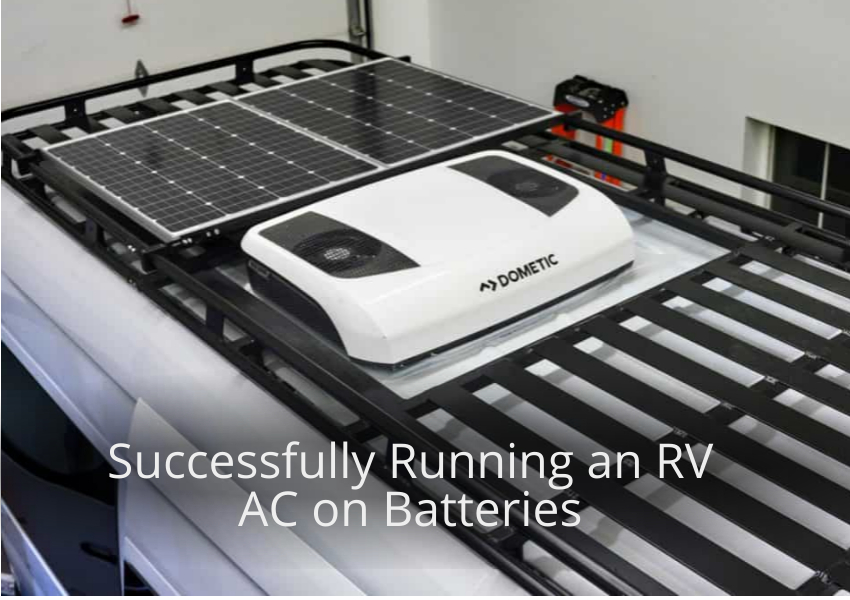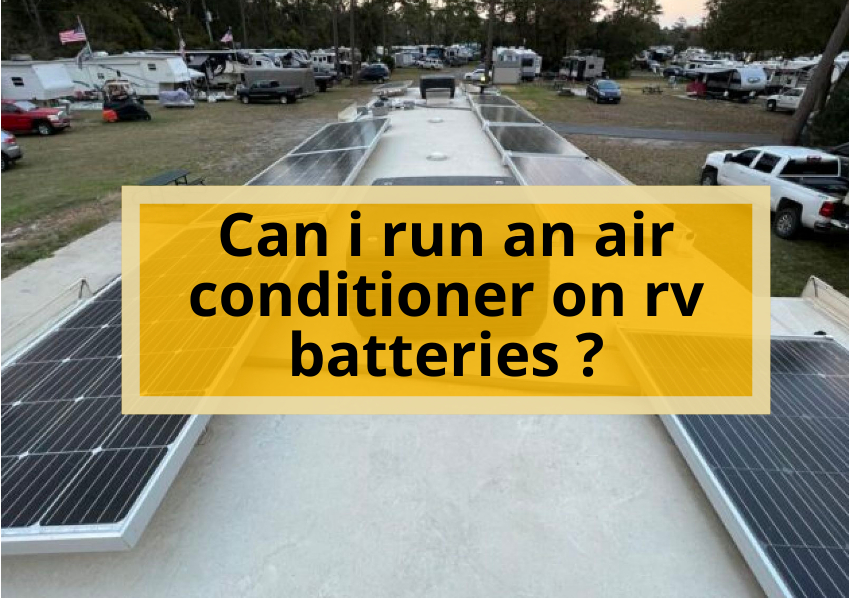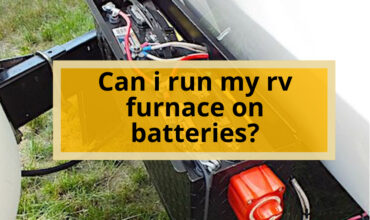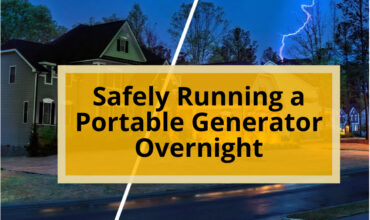Having an air conditioner in an RV can make road trips much more comfortable, especially in hot summer weather. However, running an AC unit requires a significant amount of power.
Most RVs have one or two deep-cycle batteries to run lights, water pumps, and other low-power appliances. But can these batteries handle running an AC unit? This comprehensive guide will look at what’s required to run an air conditioner on RV batteries and the pros and cons of various setups.
Power Requirements for RV Air Conditioners
Air conditioners require ample power for the compressor and condenser fan motor. For comparison, a typical RV roof AC unit draws around 1500 watts (12.5 amps) when running on 120-volt AC power. On a 12-volt DC system, the current draw is even higher due to lower voltage – around 150 amps.
This high electrical demand is beyond the capacity of standard RV batteries. Even large 6V golf cart batteries only hold around 220 amp-hours of energy. Two fully charged batteries wired in parallel could provide 150 amps for slightly over 1 hour before being depleted. Repeated deep discharges will quickly damage most lead-acid batteries.
Also read: Power Up Your RV: 4 Ways To Charge Batteries
Supplementing Battery Power
The high energy needs of AC units mean batteries alone won’t suffice for extended run times. However, combining batteries with other power sources can potentially allow an RV AC to run on a 12-volt DC. This requires careful load management and energy storage solutions. Here are some options:
– Solar power: Install 200W+ solar panels and charge controller. Sunlight can replenish batteries during the day.
– Generator: Use a small, efficient generator to charge batteries as needed. Some can be programmed to automatically start/stop.
– Battery bank: Wire 6+ large deep cycle batteries in parallel for increased capacity. Upgrade to lithium batteries for best longevity.
– Inverter: Use a pure sine wave inverter capable of high surge power for the AC compressor. Size for 200% of AC power needs.
– Shore power hookup: Plugging into shore power at an RV park is ideal for running the air conditioner and charging batteries.
Implementing these solutions requires careful planning and electrical work. Consult manufacturers’ guidelines and consider hiring an experienced RV technician. Safety should be the top priority when working with batteries, inverters, generators, etc.
Also read: Can I Run My RV Furnace On Batteries?
Pros and Cons of Running an AC Unit on Batteries
Beyond just technical feasibility, there are some key pros and cons to weigh when deciding whether to install an RV AC system powered by batteries instead of a generator or shore power.
- Quieter operation than the generator
- Reduced fuel costs if also using solar/shore power
- Cooling is available at any time without need to run loud generator
- Solar power is clean/renewable
- High battery bank cost – $1000+ for batteries alone
- Added weight and space for extra batteries
- Frequent charging is needed to avoid battery damage
- The inverter is also required for the AC unit to run on a DC
- Shore power is still ideal for longer term use
Tips for Successfully Running an RV AC on Batteries

Careful planning and proper operation can allow an RV air conditioner to run on batteries supplemented by solar, generator, or shore power:
– Audit AC run time needed daily/weekly and size battery bank appropriately
– Use the highest efficiency AC unit available to minimize power draw
– Keep batteries fully charged via solar, generator, and shore power whenever possible
– Pre-cool RV before the peak heat of the day to minimize AC run time needed
– Use a programmable generator to avoid over-discharging batteries
– Monitor voltage frequently to avoid damage from undercharged batteries
– Minimize other major loads when running AC to extend battery life
– Have shore power hookup available for extended stays and peak cooling needs
With mindful usage and the right supplemental power sources, an RV air conditioner can be run from batteries. However, it requires robust planning and energy management for sustainable off-grid use.
FAQ’s
What kind of batteries do I need to run an RV air conditioner?
The best type of batteries for running an RV air conditioner are lithium-ion batteries. Lithium-ion batteries have a high energy density, meaning they can store much energy in a relatively small and lightweight package.
Lithium-ion batteries also have a low self-discharge rate, meaning they will hold their charge longer than other types of batteries, such as lead-acid batteries.
Can I run an AC unit on just solar power?
Solar panels alone usually cannot provide enough power to run an RV air conditioner directly. But they can charge batteries to supplement overnight or cloudy day AC usage. Have at least 400W of solar charging capacity.
Do I need an inverter for my RV AC to run on batteries?
You need a pure sine wave inverter capable of high surge current to start the AC compressor from batteries. Size the inverter for at least 200% of the AC unit’s rated wattage.
Is it possible to cool my RV without shore power or a generator?
With proper planning, energy management, and the right battery bank supplemented by solar, you can run an RV air conditioner on batteries alone. But it requires a commitment to an off-grid setup.
What’s the best way to conserve battery while using my AC?
Pre-cool the RV, use awnings and shade, minimize other loads on the electrical system, and recharge batteries whenever possible. Don’t run the AC more than needed.
Conclusion
While running an RV air conditioner solely from batteries is technically possible, it requires a sizable battery bank and careful monitoring and energy management. Small RV batteries cannot handle the heavy power demands alone. Combining batteries with solar panels, a generator, inverter, and shore power access provides a more practical approach to allow air conditioning on the go. With good preparation and usage habits, you can stay cool on future RV adventures and minimize noise and fuel costs.






